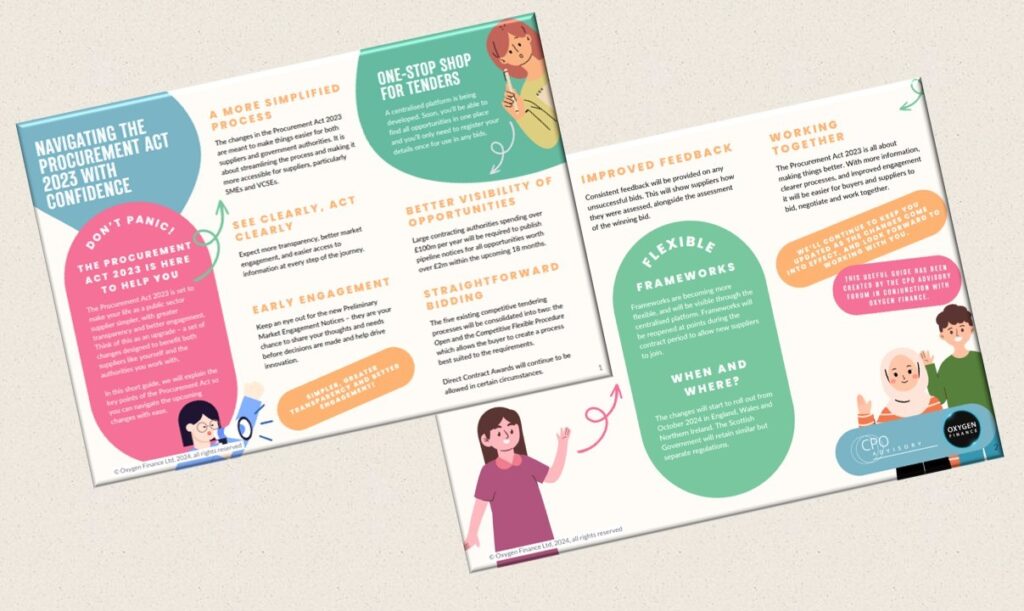Building strong relationships with potential buyers is crucial for success. Yet, if you supply products or services to the UK public sector, you’ll know how challenging it can be to engage with buyers. The process can often feel like a never-ending cycle of trying to reach out, only to be met with gatekeepers, barriers, and roadblocks. With sales teams often finding that requests from buyers for more interaction with sellers are in contradiction with the true availability and accessibility of procurement teams, how can your sales team cut through?
Whether it’s through engagement events, one-to-one chats or leveraging existing connections, sales professionals must find effective ways to connect with their target audience. The key to making these connections is collaboration and communication, which are most effective when built upon thorough research. Bidstats’ sales director, Chris Williamson, and Oxygen Insights’ John Newton and Ella Scharaschkin discuss some strategies for better approaching buyers in the public sector, so you can build stronger relationships and ultimately improve your chances of securing contracts.
Building Long-Term Relationships
When it comes to approaching buyers in the UK public sector, building long-term relationships is key. An effective way to do this is by doing a job well with one organisation, and then, once you have proven your capabilities, ask for an introduction or referral to their peers and counterparts in other organisations. This could mean starting by delivering good work on a smaller scale and utilising the experience to target bigger contracts. Making connections through past jobs can be more beneficial than cold calling, as the public sector tends to value proven, longer-term relationships that can meet its often complex and sensitive needs.
Leveraging Existing Supplier Relationships for Entry
Using existing suppliers to a public sector organisation as an introducer through a partnership arrangement can be a strategic way to get your foot in the door and start building relationships. By partnering with a company that already deals with the directorate in a similar but non-competitive field, they can introduce you to the organisation.
This can provide a new revenue stream for the existing supplier and help them retain their contract by offering additional value to the organisation. Additionally, partnering with existing suppliers can help protect your position as the installed supplier and make it harder for competitors to win contracts from you. Ultimately, this type of partnership arrangement can benefit all parties involved and create a triple win situation.
Leverage Natural Relationships
In the public sector, there is often collaboration between organisations, and individuals may have previously worked at different organisations. This can be useful when expanding your network and building trust with potential buyers, as these natural relationships can be tapped into by asking for introductions or referrals to other organisations facing similar challenges or with similar requirements.
Focus on Value and Expertise
Buyers in the public sector are often time-poor and may have limited knowledge about the products or services they are buying. As a supplier, it is crucial to provide value to buyers by offering insights that can help them make informed decisions. This could mean offering free advice, which demonstrates your expertise and builds credibility and trust with buyers. This approach not only demonstrates a genuine commitment to understanding the buyer’s needs but also sets the foundation for a long-term, mutually beneficial partnership.
Timing is Key
Leveraging pre-procurement research to understand a buyer’s upcoming requirements and timelines can help you reach out at the right time with relevant and timely information. Tools like Oxygen Insights can provide valuable market intelligence, such as upcoming contract renewals and potential opportunities, allowing you to be proactive, tailor your approach to specific buyers and position yourself as a valuable resource. Additionally, strategic contracts and early engagement opportunities can be leveraged to establish a foothold and expand the relationship with the buyer over time.
Quality Over Quantity
In the world of sales, ‘luck’ is really the outcome of research, preparedness and effort. Instead of casting a wide net and reaching out to as many buyers as possible, focus on targeted, well-researched engagement with the right buyers at the right time. For example, attending supplier events is a great way to build relationships and get to know buyers, but not all supplier events are created equal, so it’s important to focus on events where meaningful conversations can take place. By homing in on the most promising opportunities and being well-prepared for those conversations, you can increase your chances of success.
Asking the Right Questions
The right approach to cold calls can make them a useful tool for connecting with buyers. Preparation and research are crucial to making the most of a call, such as looking for award notices to gain an understanding of the current market situation. Asking the right questions is key – the conversation should be built upon your understanding of the buyer’s needs and focused on how you can add value to the buyer.
Engagement with a buyer should be informative for both parties – a successful interaction will leave the buyer more informed on how the supplier can bring value, but it is also important that the supplier gathers beneficial information. The valuable insights gained from one call can be used to qualify leads, create opportunities to further the sales process and ultimately increase the chances of building successful relationships.
Adapt to the Public Sector Environment
Approaching buyers in the public sector requires a different mindset than dealing with private sector clients. It’s essential to understand the unique challenges and constraints that buyers in the public sector face, and tailor your approach accordingly. This means approaching interactions with buyers with a focus on serving the public and meeting their specific requirements, rather than just making a sales pitch. By being buyer-centric and providing valuable and relevant insights and expertise, you can set yourself apart from the competition.
Leverage Referrals
A powerful way to get in front of buyers in the public sector is through referrals. Whether it is a referral from someone within the same organisation or from another public sector organisation in the same field, a recommendation from a trusted source can open doors and facilitate meaningful conversations with buyers. Building a strong track record with one organisation can lead to referrals to their counterparts in other organisations, creating opportunities for collaborative procurement and mutual learning. Leveraging referrals can also help establish credibility and trust, making it easier to engage with buyers who may otherwise be difficult to reach. By prioritising referrals as a key aspect of your business growth strategy, you can tap into the interconnected nature of the public sector and establish a strong presence across multiple organisations.
Building relationships in the public sector requires a proactive and strategic approach. By going the extra mile to gather relevant insights and gaining an understanding of the procurement needs and decision-making processes within the public sector, businesses can position themselves as valuable assets. It’s important to approach relationship-building in the public sector as a long-term game, focusing on providing value and building partnerships that benefit both parties. This not only increases the chances of winning contracts but also helps in retaining and expanding business with public sector organisations.
By focusing on building long-term relationships, leveraging natural relationships, providing value and expertise, and adapting to the public sector environment, firms can better approach buyers and improve their chances of securing contracts.
With an approach based on effective research and preparation and a willingness to adapt to the unique environment of the public sector, firms can build strong, lasting relationships with buyers and drive success in this market.




